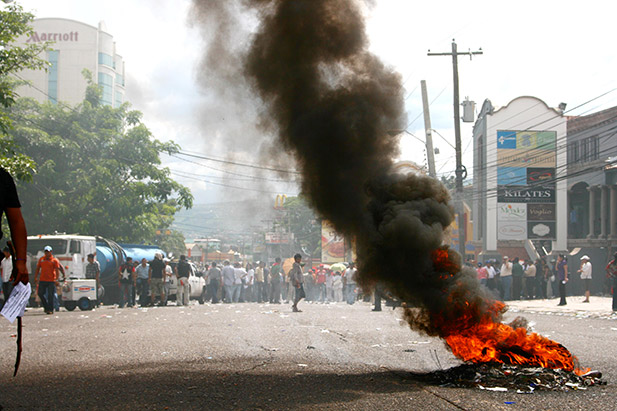Political turmoil in Honduras: Have Canadian actions been a factor?
December 11, 2017

By Tim MacNeill, PhD, Associate Teaching Professor (Political Science), Faculty of Social Science and Humanities
The views and opinions expressed are those of the author and do not necessarily reflect the views and opinions of the university.
In a news cycle dominated by accusations of sexual improprieties, American politics, a pending royal wedding and more, Canadians may have little, if any, awareness of the violence unfolding this month in Honduras.
The civil unrest in the small Central American nation threatens to amplify into civil war. Many Canadians will see Honduras’ emergency as another tragic story of a troubled nation whose political turmoil has little to do with them. But the situation does have something to do with Canada. Quite a bit actually.
Through the ambivalence of the Canadian government and the interference of some of our country’s most powerful corporations, we Canadians are all partially culpable. In an academic article I published on researchgate.net in 2015, I detailed how the stage was set for such a political meltdown. In 2008, Manuel Zelaya, Honduras’ democratically elected president, had instituted protections for the natural environment and increases in wages amongst other progressive policies. These moves threatened profitability of some of the largest Canadian gold mining companies, textile manufacturers, and tourism businesses, along with powerful Honduran business elites. In 2009, those elites in the country orchestrated a military coup.
Within a year, gains in wages and environmental protections in Honduras were reversed, and Canadian companies came to control the majority of Honduran gold mines and a large portion of manufacturing and tourism operations. Although the international community largely denounced the coup, Canada did not. In fact, Canada’s then-Minister of State for Foreign Affairs for the Americas, Peter Kent, advised against the return of the democratically elected Zelaya. Canada immediately began negotiating a trade deal with the new dictatorship as trade and investment between the two countries increased dramatically.
Prime Minister Stephen Harper made a state visit to the country in 2011, further validating the Honduran regime while military repression and assassinations became widespread. Elections in 2013 extended the ruling party’s power. International human rights monitors denounced them as fraudulent, but the Canadian government supported the elections. Eighteen opposition candidates were assassinated during that campaign.
The years since 2013 have seen multiple assassinations of Honduran opposition leaders amidst continued repression and state-inflicted human rights abuses. This violence and despotism has occurred amidst a dramatic increase in Canadian investment and intensified political relations with the country.
In recent weeks, mass protests have erupted throughout Honduras as opposition supporters accuse the dictatorship of orchestrating yet another fraudulent election. Although no winner has been declared, sitting president Juan Orlando Hernández holds a narrow lead, while main opposition contender Salvador Nasralla demands a full recount. Because of the violence, the government imposed a curfew to be enforced by both the national police force and the military. However, after the killings of at least 11 protesters, the national police refused to enforce the curfew.
A member of the anti-riot squad stated, “We are tired. And our job is to give peace and security to the Honduran people, not repress them. We want all Hondurans to be safe.” The military remains loyal to Hernández, rendering the country a powder keg.
It is not likely that the Canadian government or Canadian corporations were actively involved in the 2009 coup. But both did reinforce the power of the repressive regime through overt endorsement and an exuberant increase in economic relations.
Repression in Honduras has been profitable for Canada while average Hondurans have seen decreasing wages amidst increased unemployment, poverty and human rights abuses. As Honduras is poised for civil war, Canadians may want to think about asking both their government and corporations to adhere to a more strict ethical code.
Postscript: After years of silence on corruption in Honduras, Canadian Minister of Foreign Affairs Chrystia Freeland made a statement on December 2 calling for the “respect of human rights as the election is resolved”. Let’s hope this marks a change in the Canadian attitude toward the respect of human rights and democracy in the countries with which we do business.



